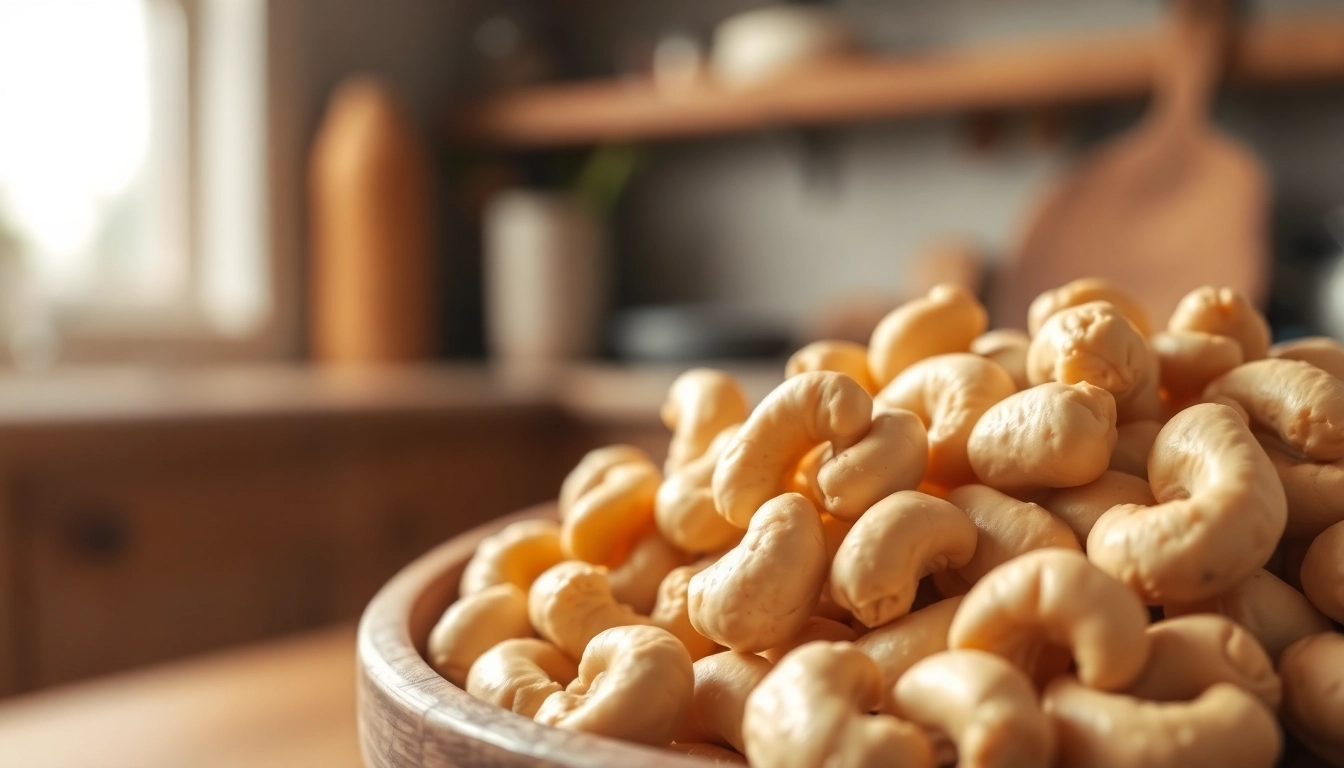
Understanding Cashew Nuts
What Are Cashew Nuts? Characteristics and Origin
Cashew nuts, scientifically known as Anacardium occidentale, are unique in that they are not true nuts but rather seeds derived from the cashew apple, a fruit that grows on the cashew tree. Originating from Northeast Brazil, the cashew tree was first introduced to the African and Asian continents. Today, it thrives in warm climates around the world, with notable production in countries like India, Vietnam, and Nigeria. The cashew nut is widely loved for its rich, creamy flavor and its versatile applications in culinary practices.
The Nutritional Profile of Cashew Nuts
Cashews are a nutritional powerhouse. They are high in protein, healthy fats, and a variety of essential vitamins and minerals. A one-ounce (28-gram) serving of cashew nuts provides approximately:
- Calories: 157
- Protein: 5.2 grams
- Fat: 12.4 grams (of which saturated fat is 2.2 grams)
- Carbohydrates: 8.6 grams
- Fiber: 0.9 grams
- Iron: 1.7 mg (10% DV)
- Magnesium: 82 mg (20% DV)
- Zinc: 1.6 mg (10% DV)
- Copper: 0.6 mg (31% DV)
This impressive nutrient profile, featuring high levels of unsaturated fats, makes cashew nuts an excellent choice for adding to a balanced diet. For more detailed nutritional information, various resources break down the benefits of including cashew nuts in our meals.
Culinary Versatility of Cashew Nuts in Recipes
Cashew nuts are renowned not just for their delightful flavor but also for their incredible culinary versatility. They can be eaten raw or roasted, salted or unsalted, and are often used in a variety of dishes ranging from savory to sweet. Their creamy texture makes them an ideal ingredient for:
- Snacks: Cashews can be enjoyed as a quick snack on their own or mixed with spices, herbs, and other nuts.
- Cooking: They can be added to stir-fries or salads to enhance texture and flavor.
- Baking: Cashew nuts can be included in nut mixes, cookies, or trail bars.
- Nut butters: They are commonly ground to make delicious cashew butter, which can be used in spreads or smoothies.
- Vegan dishes: Blended cashews serve as a fantastic base for creamy sauces, soups, and desserts, providing a dairy-free alternative.
Health Benefits of Cashew Nuts
Essential Nutrients Found in Cashew Nuts
Beyond their delightful taste, cashew nuts are packed with essential nutrients that contribute significantly to overall health. They are particularly high in heart-healthy monounsaturated fats, which help lower cholesterol levels and decrease the risk of heart disease. Additionally, cashews are rich in minerals such as magnesium and copper, both of which play critical roles in bone health and energy production.
How Cashew Nuts Support Heart Health
Research indicates that a diet inclusive of cashew nuts can have a positive impact on heart health. Their combination of healthy fatty acids, fiber, and antioxidants can contribute to:
- Lower blood pressure: The magnesium content in cashews helps relax blood vessels, thereby lowering blood pressure.
- Reduced cholesterol levels: Regular consumption of cashew nuts has been shown to lower ‘bad’ LDL cholesterol while increasing ‘good’ HDL cholesterol.
- Anti-inflammatory effects: Cashews contain antioxidants that can help combat oxidative stress and inflammation, further protecting heart health.
The Role of Cashew Nuts in Weight Management
Despite being energy-dense, studies have shown that nuts, including cashews, can support weight management when eaten in moderation. They are high in protein and fiber, two nutrients that promote satiety and can help reduce overall calorie intake. Incorporating cashews into a diet can help reduce cravings for less nutritious snacks.
Incorporating Cashew Nuts into Your Diet
Simple Ways to Add Cashew Nuts to Meals
Incorporating cashew nuts into your diet can be simple and enjoyable. Here are several easy methods:
- Add them to oatmeal or yogurt for a nutrient boost at breakfast.
- Sprinkle chopped cashews over salads for added crunch and flavor.
- Mix them into homemade granola or energy bars to enhance texture.
- Use ground cashews as a thickening agent in soups or sauces.
Delicious Snack Ideas Featuring Cashew Nuts
If you’re looking for nourishing snacks that include cashew nuts, consider these ideas:
- Homemade cashew energy balls made with dates, cocoa powder, and rolled oats.
- Cashew cheese spread blended with nutritional yeast for a tasty, vegan alternative.
- Roasted cashews tossed with spices like paprika or curry for a flavorful treat.
Cashew Nuts in Plant-Based Cooking
Cashew nuts are a staple in many plant-based diets, primarily due to their creamy texture and neutral flavor. They can be used in:
- Creations like cashew cream for sauces and soups.
- Vegan cheesecakes where cashews provide the necessary creaminess.
- Substitutions for dairy in high-calcium recipes like plant-based cheesing.
- Nut milk, offering a dairy-free alternative to traditional milk.
Cashew Nuts: Myths and Facts
Are Cashew Nuts Allergens or Healthy Choices?
While cashew nuts can be allergens for some individuals, they contain beneficial properties that make them a healthy choice for most others. It’s essential to differentiate between allergies and intolerances. For the majority of consumers, cashew nuts can be incorporated into a balanced diet without concern.
Cashew Nuts vs. Other Nuts: A Comparative Analysis
When it comes to nutrition, cashews compare favorably to other popular nuts like almonds and walnuts. Although almonds are generally higher in fiber and protein, cashews provide a higher level of iron and magnesium. This comparison highlights the importance of variety in your nut intake to maximize nutritional benefits.
Common Misconceptions About Cashew Nuts
Several myths swim around regarding cashew nuts, such as their classification and health implications. A prevalent misconception is that cashew nuts are very high in unhealthy fats. However, studies have demonstrated that the majority of fat in cashews consists of healthy unsaturated fats, benefitting cardiovascular health.
Purchasing and Storing Cashew Nuts
How to Choose Quality Cashew Nuts
When purchasing cashew nuts, look for those that are whole, undamaged, and free of any off-putting odor. Ideally, they should be stored in airtight containers and kept away from light and moisture to maintain freshness.
Storage Tips to Keep Cashew Nuts Fresh
To maximize the shelf life of cashew nuts, it is recommended to store them in a cool, dark place. Ideally, in an airtight container in the refrigerator, they can last for up to six months. Freezing cashews can extend their freshness to about a year.
Where to Buy Cashew Nuts Online and Locally
Cashew nuts are widely available online and in most grocery stores. Stores like Amazon, Walmart, and specialty health food retailers offer bulk purchasing options. For locally sourced nuts, visiting farmer’s markets can provide fresh options with minimal processing.








